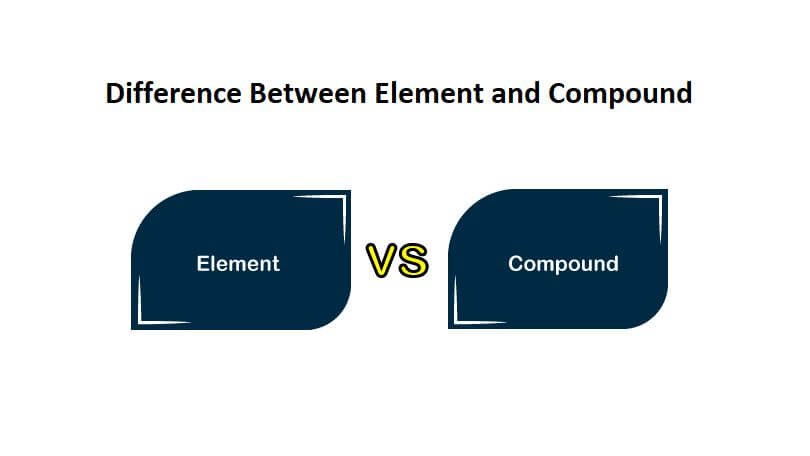Differences Between Elements And Compounds

This is only one of several often asked chemical science examination questions most the distinction between an element and its compound. Students must be well-versed with the list of various elements and compounds in order to fully embrace them. Compounds and elements are chemical substances constitute in nature, which is the most of import thing to know.
Element Vs. Compound
The diminutive nuclei of an element and those of a compound have different numbers of protons, yet an element is a distinct species of cantlet. An elemental mixture of molecules and atoms is referred to as a chemical compound because it is held together by chemical bonds and contains atoms from several elements.
Oxygen is an instance of an element. Oxygen has an atomic volume of 8, hence whatever atom with eight protons is included in this category. Compounds may be divided into iv principal categories based on how the atoms in each component are connected to 1 other. Covalent bonds, ionic bonds, metallic bonds, and coordinated covalent bonds are all examples of these.
Element
In the simplest terms possible, an chemical element may be described as a material equanimous more often than not of one or more kinds of atoms.
Fe, with the chemical symbol Fe, is an example of an element. A total of 118 elements have been identified. 24 of the 118 elements are synthesized, whereas the remaining 94 elements may be institute on Earth in their natural states.
"Chemical element" is a give-and-take used to describe all atoms with a sure number of protons, regardless of whether or not they are chemically bound. Hydrogen, which may be institute in water, is an excellent example of this. Chemical substances in their purest form, such as hydrogen gas, are often referred to as single-element compounds.
Each of the 94 naturally occurring elements with atomic numbers ranging from i to 82 has at to the lowest degree 1 stable isotope. Technetium (chemical element 43) and promethium (element 61) are exceptions to this norm. There are no stable isotopes of whatever of these elements. You lot demand to know that stable isotopes take non experienced any radioactive decay.
Compound
Chemical compounds are substances that include at to the lowest degree two singled-out types of atoms or chemical elements that are stock-still in a stoichiometric proportion and may also exist referred to as chemical compounds. The proportions of any non-stoichiometric chemical may exist easily reproduced by using the aforementioned precise preparations each time.
Chemical bonds bind chemical substances in a specific spatial organization with a specific chemic construction that is 1-of-a-kind. Compounds may be classified according on the sort of bail holding them together.
Coordinate covalent bonds are used to hold molecular compounds together, for example, as well as intermetallic compounds, salts and chemical complexes.
Difference Between Chemical element and Compound
- Elements are substances that only accept one kind of atom in them. Compounds, on the other hand, are things that are fabricated upwardly of at least two distinct types of atoms or elements that are linked together chemically.
- 118 elements exist, of which 94 are found in their natural condition on Earth; compounds are characterised by the kind of bonds that link them, such as molecular, metallic, or ionic, and the number of atoms in each.
- Symbols and numbers are always used to represent elements, such as sodium (Na). NaCl is the chemic formula for sodium chloride; nonetheless, compounds are usually referred to by their chemical formula.
- Atomic numbers distinguish between distinct types of elements, while compounds are characterised by their fixed ratio of different elements in a certain organisation.
- No chemical process may further decompose an element. Chemical reactions, on the other hand, arrive very easy to intermission downwardly or carve up complex molecules into their constituent parts.
- Gilded, atomic number 26, and copper are a few examples of elements. Sodium hydroxide, as well known equally NaOH, and sodium chloride, sometimes known as NaCl, are examples of compounds.
Determination
When you understand the difference betwixt an element and a chemical compound, it will be easy to tell them apart. Compounds, on the other hand, are made up of a variety of distinct atoms.
Compounds are made upward of a variety of singled-out substances. Compounds may also be cleaved down quite easily. However, attempting to dissect an element is pointless. Try dissolving hydrogen and y'all'll get the gist of what this sentence means.
Differences Between Elements And Compounds,
Source: https://difference-between.net/difference-between-element-and-compound/
Posted by: elkinsgoinfory.blogspot.com



0 Response to "Differences Between Elements And Compounds"
Post a Comment